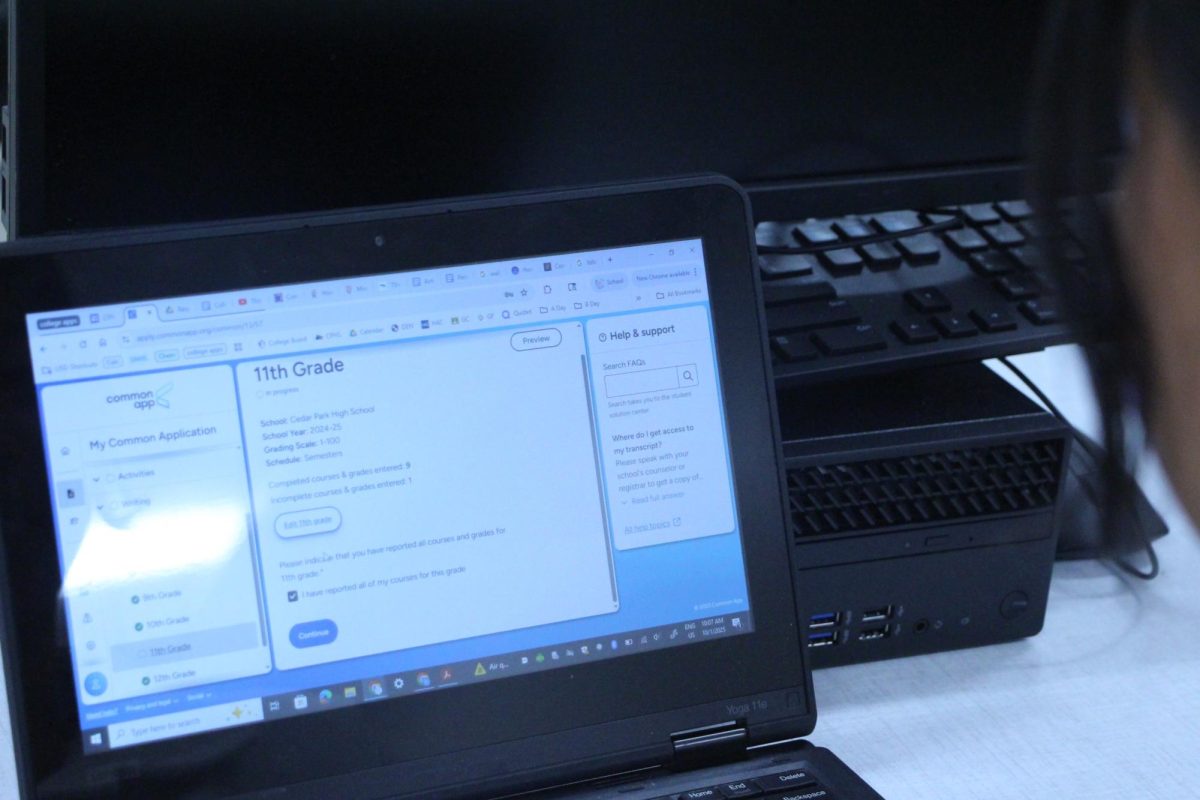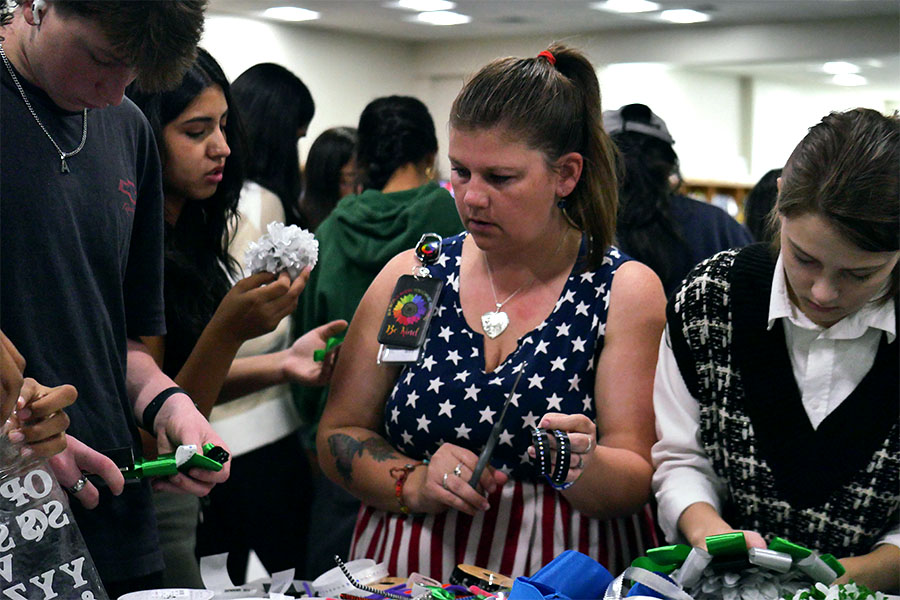Chess is a game that requires not only an understanding of the rules, but also being able to take advantage of all situations players might encounter.
Offering a chance to get to know new people and to improve your chess skills, the Chess Club has meetings every Thursday during DEN in room 2025. Club members are able to work on a variety of skills while beating or getting beaten by the best students in the club.
“My best experience is beating Eric Zolidis at chess,” junior Don-Oh Chung said. “He’s a really high level and beating people better than you is really fun.”
Practicing with other members, junior Eric Zolidis has been in the club for quite some time and has been playing chess since he was in elementary school, including tournaments.
“I was playing in a tournament for money and my opponent was someone who was better than me by 400 to 500 points,” Zolidis said. “I realized my opponent blundered and what happens is that my heart just starts pumping and I feel like I’m gonna get a heart attack. When I won that game, I just felt genuinely incredible.”
Students in the club all have different ways of improving their skills. Many choose to practice online or watch tutorials, while others prefer more traditional ways of playing.
“I watch a lot of videos; they help me get better,” Ho said. “I also play a lot in person. Playing chess in person is a lot different because you see the board differently. So, if you want to play better in person, you play in person.”
When people play online, the chess board usually lists the position of the pieces using the letters A-H and the numbers one to eight. Not having this memorized could lead to confusion when someone yells “move the pawn to C4.”
“Over the board chess is a lot harder to do,” Zolidis said. “Most people nowadays just get into chess through things like Chess.com and all of those online sites, and although over the board tournaments are fun, it’s impractical to study by just doing that.”
Here’s another difference, online chess makes it impossible to purposely let the king be taken, whether that be moving a piece to leave the king defenseless or moving the king next to a piece that can attack it.
Another way students in the chess club get better is practicing their openings because the way members start a game could significantly impact the rest of the game.
“When I was trying to practice openings on real people it was kind of hard,” freshman Ayaan Maredia said. “A lot of people online didn’t actually know how to play in lower ratings and don’t even know how to use openings in the board; when you go into tournaments and stuff, it’s harder to actually play those openings.”
Payden Sawicki, one of the world history teachers and sponsor of the chess club, compares chess to something like Texas Hold’em, a popular variant of poker that isn’t entirely exclusive to casinos.
“I equate chess a lot to mathematical percentages,” Sawicki said. “Each move you make changes the statistical chance of achieving a victory.”
There are many games that are also acquainted to mathematical percentages.
“Unfortunately, as a non-chess player I cannot give a specific example of this in the chess realm,” Sawicki said. “However, I can provide a comparable activity in terms of statistics; Texas Hold’em. For example, at the beginning of each round every player is dealt a card, each with a predetermined statistical chance of winning.”
In specific, a hand with a two and seven has about a 38% chance of winning while a hand with two kings jumps all the way to 83%.
“Obviously, this game also depends on a player’s skill level and some degree of luck,” Sawicki said. “Nonetheless, it still has a direct correlation to chess due to the similarities in analytical practices to win.”






![As her hair blows in the wind, senior Brianna Grandow runs the varsity girls 5K at the cross country district meet last Thursday. Grandow finished fourth in the event and led the varsity girls to regionals with a third place placement as a team. “I’m very excited [to go to regionals],” Grandow said. “I’m excited to race in Corpus Christi, and we get to go to the beach, so that’s really awesome.” Photo by Addison Bruce](https://cphswolfpack.com/wp-content/uploads/2025/10/brianna.jpg)


![Broadcast, yearbook and newspaper combined for 66 Interscholastic League Press Conference awards this year. Yearbook won 43, newspaper won 14 and broadcast took home nine. “I think [the ILPC awards] are a great way to give the kids some acknowledgement for all of their hard work,” newspaper and yearbook adviser Paige Hert said. “They typically spend the year covering everyone else’s big moments, so it’s really cool for them to be celebrated so many times and in so many different ways.”](https://cphswolfpack.com/wp-content/uploads/2025/05/edited-ILPC.jpg)





![Sitting with her friend senior Sohpia Struve at last year’s Austin City Limits Festival, senior Ava Zuniga poses for a picture under a pavilion. They are frequent attendees at ACL, an annual music festival at Zilker Park. “I would recommend seeing a bunch of people,” Zuniga said. “This past year, we camped out for Chappell [Roan] for a really long time. I think the whole point of ACL, [which] is a lot of fun, is that you can go see so many different people, even if you don’t know them. So by camping by one person, it really limits yourself from being able to go see a bunch of people.” Photo courtesy of Ava Zuniga](https://cphswolfpack.com/wp-content/uploads/2025/10/EE9E9484-FE6F-4AA0-B5F5-0C177AB32841-1200x857.jpeg)
![Looking down at his racket, junior Hasun Nguyen hits the green tennis ball. Hasun has played tennis since he was 9 years old, and he is on the varsity team. "I feel like it’s not really appreciated in America as much, but [tennis] is a really competitive and mentally challenging sport,” Nguyen said. “I’m really level-headed and can keep my cool during a match, and that helps me play a bit better under pressure.” Photo by Kyra Cox](https://cphswolfpack.com/wp-content/uploads/2025/09/hasun.jpg)

![Bringing her arm over her head and taking a quick breath, junior Lauren Lucas swims the final laps of the 500 freestyle at the regionals swimming competition on date. Lucas broke the school’s 18-year-old record for the 500 freestyle at regionals and again at state with a time of 4:58.63. “I’d had my eye on that 500 record since my freshman year, so I was really excited to see if I could get it at regionals or districts,” Lucas said. “ State is always a really fun experience and medaling for the first time was really great. It was a very very tight race, [so] I was a bit surprised [that I medaled]. [There were] a lot of fast girls at the meet in general, [and] it was like a dogfight back and forth, back and forth.” Photo by Kaydence Wilkinson](https://cphswolfpack.com/wp-content/uploads/2025/03/Kaydence-2.7-23-edit-2.jpg)
![As the support team sits and poses for a photo in the cafeteria with the counseling team they eagerly wait to start their day. "We [all] seem to be a team, I get up every day and there's days where I don't want to go to work today, but I'm thankful that I have a job and I'm blessed to have what I have," Christopherson said. Photo Courtesy of Julie Weltens.](https://cphswolfpack.com/wp-content/uploads/2025/01/AF9E8470-10D7-4C91-BF28-EC8F86BAB66C-1200x852.jpeg)
![Jumping off the ground, senior linebacker Bennett Patton snatches the ball out of the air for an interception at Thursday’s game against Chaparral. Patton had two interceptions in the 56-14 victory, tying the school record for interceptions in a game. “I was just playing the game,” Patton said. “[I’m] going to go into next week, forget about it and stay humble.” Photo by Harper Chapman](https://cphswolfpack.com/wp-content/uploads/2025/09/bennett-interception.jpg)















